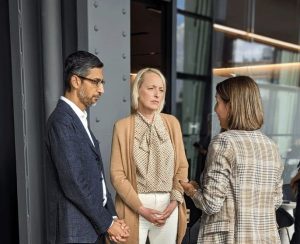Corporate America steps up to support refugees
A group of the world’s most powerful CEOs has been quietly supporting the US refugee settlement effort get back to its pre-COVID intake levels.
Led by Alphabet’s Sundar Pichai and Accenture’s Julie Sweet, the ‘CEO Council’ of 36 top US corporate leaders is serving as a business sector bulwark to ‘Welcome.US’, a not for profit organisation established by former Bush and Obama administration staffers last year to help resettle refugees.
The CEO group has been quietly operating for the past six months, but recently Mr Pichai and Ms Sweet felt the need speak about their work.
“When these are people here, how do you help them settle down? Everybody understands the scale challenge,” Mr Pichai told media, at an all-day clinic to help 22 refugees and their families get through the asylum application process at Google’s event space in New York.
 Welcome.US was launched around the concept that the US government needed help just to integrate some 80,000 Afghan refugees, many of who had assisted the US military during its two-decade stay there.
Welcome.US was launched around the concept that the US government needed help just to integrate some 80,000 Afghan refugees, many of who had assisted the US military during its two-decade stay there.
Then came the Ukraine war, which increased the urgency of a need for more private sector support.
Welcome.US CEO Nazanin Ash approached Ms Sweet, whose company was already interested in supporting the cause and she, in turn, recruited Mr Pichai, an immigrant himself who has also become involved.
“I think we’d all seen that the (refugee settlement) system itself wasn’t scalable, and there was a role for business. And Sundar and I talked about it then to say, ‘Is this something that really could lead to not just a one-time intervention, but scale and a change?’,” Ms Sweet told US media.
The answer came swiftly with 36 CEOs joining up. They include Airbnb’s Brian Chesky, Snap’s Evan Spiegel and Chobani’s Hamdi Ulukaya, Amazon’s Andy Jassy, Starbucks’ Howard Schultz and Walmart’s Douglas McMillon. Wall Street is represented by Goldman Sachs’ David Solomon, Bank of America’s Brian Moynihan and AIG’s Peter Zaffino.
So far, tens of thousands of refugees have received Google Pixel phones, along with mobile data plan as well as laptops with software installed.
There have also been corporates offering jobs; including from Pfizer, Manpower Group and Chobani.
But perhaps the biggest contribution the group has made is in the public perception of migrants.
Despite the toxic debate about migrants and asylum seekers in US, the corporate figures, and their staffs, have taken a stand to make the case that refugees and migrants are what America was built on.
They have pointed out that immigrants, particularly skilled ones, historically prove net job creators in the US.
Mr Ash says the CEOs and their organisations have filled a leadership vacuum.
“Citizens, communities, the private sector, civic institutions, are ahead of policymakers and politicians in their willingness to welcome,” he said.
And he says the biggest supporters of the CEO Council are their employees, who appreciate their bosses taking an ethical stand.
Mr Pichai says staff volunteering is good for team-building, especially for a more hybrid workforce.
“I actually find a lot more engagement and a set of shared bonding when we work on projects like this,” he said.
Ms Sweet says Americans mostly want to help.
“And this is something that, internally, companies were looking for. Yes, I will write a check, but what I want is also an opportunity to touch lives,” she said.
The other dividend attractive to the corporate leaders is building corporate muscle memory in an environment where new challenges appear to pop up monthly and where corporate leadership can step in when governments don’t.
“We had anticipated that doing it, would mean we could be ready for additional crises,” Ms Sweet said
“We hadn’t anticipated Ukraine would happen when it did. But it was amazing to have the foundations in place,” she said.












